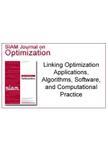版权所有:内蒙古大学图书馆 技术提供:维普资讯• 智图
内蒙古自治区呼和浩特市赛罕区大学西街235号 邮编: 010021

作者机构:Univ Alicante Dept Math Alicante Spain Univ Southampton Sch Math Sci Southampton SO17 1BJ Hants England
出 版 物:《SIAM JOURNAL ON OPTIMIZATION》 (工业与应用数学会最优化杂志)
年 卷 期:2020年第30卷第1期
页 面:980-1006页
核心收录:
学科分类:07[理学] 070104[理学-应用数学] 0701[理学-数学]
基 金:MICINN of Spain [RYC-2013-13327, MTM2014-59179-C2-1-P, PGC2018097960-B-C22] ERDF of EU [RYC-2013-13327, MTM2014-59179-C2-1-P, PGC2018097960-B-C22] FWF (Austrian Science Fund) [M 2499-N32] Vietnam National Foundation for Science and Technology Development (NAFOSTED) [101.01-2019.320]
主 题:difference of convex functions boosted difference of convex functions algorithm Kurdyka-Lojasiewicz property clustering problem multidimensional scaling problem
摘 要:The boosted difference of convex functions algorithm (BDCA) was recently proposed for minimizing smooth difference of convex (DC) functions. BDCA accelerates the convergence of the classical difference of convex functions algorithm (DCA) thanks to an additional line search step. The purpose of this paper is twofold. First, we show that this scheme can be generalized and successfully applied to certain types of nonsmooth DC functions, namely, those that can be expressed as the difference of a smooth function and a possibly nonsmooth one. Second, we show that there is complete freedom in the choice of the trial step size for the line search, which is something that can further improve its performance. We prove that any limit point of the BDCA iterative sequence is a critical point of the problem under consideration and that the corresponding objective value is monotonically decreasing and convergent. The global convergence and convergence rate of the iterations are obtained under the Kurdyka-Lojasiewicz property. Applications and numerical experiments for two problems in data science are presented, demonstrating that BDCA outperforms DCA. Specifically, for the minimum sum-of-squares clustering problem, BDCA was on average 16 times faster than DCA, and for the multidimensional scaling problem, BDCA was 3 times faster than DCA.